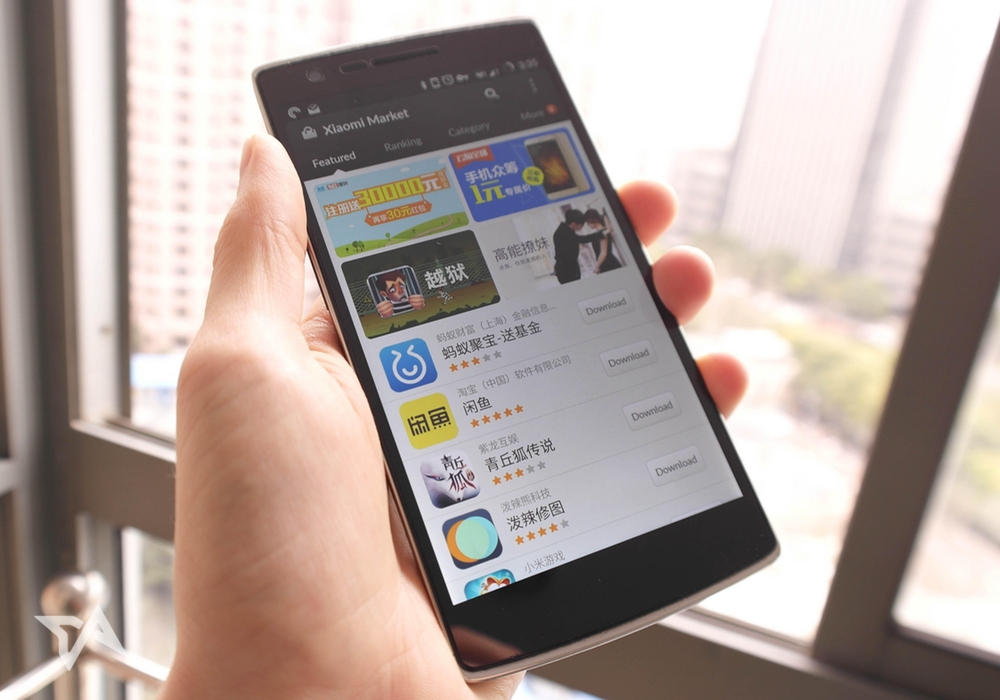9 alternative Android app stores in China

Xiaomi’s app store pictured on a OnePlus phone.
Even before Google and every single one of its services got blocked in China mid-2014, the nation’s Android phone owners weren’t fans of the official Google Play store. That prompted a billion-dollar industry in alternative Android app stores.
China’s tech titans now dominate Android app distribution.
At first it was startups which disrupted Google Play, but eventually China’s tech titans weighed in, and they now dominate Android app distribution just as they control so much else in the country’s online life.
Here’s our list of the nine most significant Android app portals in China, with the ones run by major local tech firms presented first. If you’re an app developer looking to gain users in China, these are the ones you need to know about.
1. Baidu App Store
Baidu is China’s top search engine.
Baidu App Store is available for Android. As with most on this list, there’s also a website for installing Android ‘.apk’ files without needing to sign up or download the actual mobile version.
The company is clearly taking its App Store seriously after dishing out US$1.9 billion toacquire rival 91 Mobile in 2013. The two apps still run independently.
2. Tencent App Gem
Tencent is China’s social media giant, with nearly 700 million monthly active users on its WeChat messaging app.
As China’s citizens switched to smartphones, Tencent has also piled more resources on to its own Android app store. It’s now one of the largest in the country. The company uses WeChat to give a boost to App Gem. A few days before a new WeChat update arrives on Android, it gets an early launch on Tencent App Gem before the freshest version of WeChat is distributed to other app stores. The ruse is that you need to install the App Gem store in order to access the early WeChat release.
3. Xiaomi App Store
This isn’t limited to Xiaomi phones – it’s also available as a web app and an Android app that can be installed on any Android device.
The Xiaomi App Store is a rarity in that it supports paid apps as well as in-app purchases for games – though the in-game extras are limited to titles published in conjunction with Xiaomi.
4. Huawei App Store
Just as Xiaomi’s rise has boosted its web services and app portal, the Huawei App Store is growing in prominence as Huawei gains traction in its home market.
After initially being whipped by Xiaomi, Huawei is now catching up in the Chinese market. In 2015, Xiaomi remained China’s top selling phone brand, edging out Huawei by a small margin, according to data from Canalys.
5. Qihoo 360 Mobile Assistant
Just as Qihoo barged into the search market in 2012 in order to disrupt Baidu, so Qihoo is now doing the same with its revamped 360 Mobile Assistant.
Qihoo is China’s second biggest search engine. It also has a lot of other resources that can be used to bring more traffic to its third-party Android app store – such as its popular web browsers for PC and Android.
6. Wandoujia
Plucky Wandoujia is China’s top independent, startup Android app store with over US$120 million in VC funding to help it battle the nation’s top web firms.
The startup has around US$120 million in VC funding.
While the startup can’t send a ton of traffic from web portals like its major rivals, it can negotiate installation deals with some phone-makers or distributors, giving the app a claimed 800,000 new installs each day at the last count.
It’s also done a bunch of things to appeal to the geekiest of Chinese smartphone users, such as handing out awards to the best designed apps.
7. 91 Mobile Assistant
This was one of China’s first startup app stores for Android. It was acquired by Baidu (see #1 on this list) in 2013. It still runs under its own name.
8. HiMarket
This is the other Baidu acquisition.
Often when I browse gadget malls in China I find that HiMarket has been installed on a number of the grey-import Android phones – the ones smuggled in tax-free from Hong Kong and then tweaked to include a different ROM and a deluge of pre-installed apps (all of which earn the importer or vendor some under-the-table money). So I always get the feeling this store is kind of dodgy, along with others often flashed onto grey-import phones like Anzhi(not on this list). Baidu, of course, would disagree strongly with that perception.
However, since a great many of China’s Android phones and tablets are grey imports, it’s a huge market for app stores to tap – especially as preinstalled stores usually cannot be uninstalled.
9. D.cn
D.cn – called Dang Le in Chinese – was born out of a gaming web portal, but the Games Center has all kinds of apps. Inevitably, there’s a strong preference towards games, which dominate the frontpage of the website.
This site has long been an official partner of Rovio Mobile for distributing the free-with-ads versions of the Angry Birds series in China.
D.cn has an Android app and a web app.
0 comments:
Post a Comment